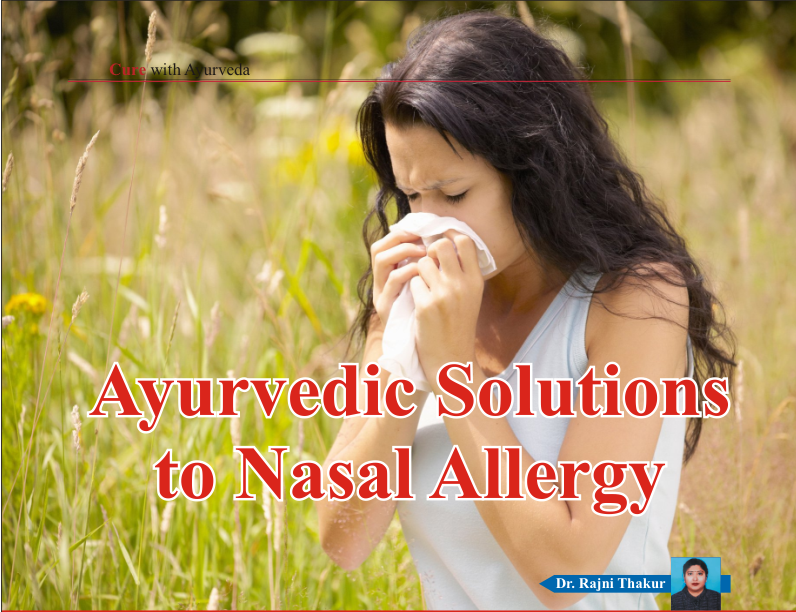Nasal allergy is a global concern as the incidence of the disease has increased dramatically in recent years which has imposed a heavy burden to general well being.
Allergy represents a global health problem. It is extremely common disease worldwide and significantly alters the social life of patients. It is an exaggerated response of immune system to the foreign substances such as pollens, food, dust, animal dander, cosmetic products which cause an allergic reaction in any part of the body that may be nose, eyes, throat, stomach or skin. When our body comes in contact with foreign particles, it overreacts and produces anti bodies. These antibodies start a chain of features in the form of sneezing, watering, itching, coughing and airway obstruction. This response to foreign particles is presented in two phases.
The first is immediate which occurs with in fifteen minutes of exposure. The second phase occurs 4 to 6 hours after the disappearance of the first one.
Among all types of allergies, nasal allergy is very common condition affecting 30% of general population. It is commonly called hay fever. It is a major chronic respiratory disease due to its prevalence and its impact on quality of life. Its peak incidence is highest in children and young adults. Boys have higher risk of developing allergies than girls. Heredity is the most significant factor in causing nasal allergy. Its development results from complex interplay between a person’s genetic makeup and its interaction with the environment. Having family members with allergic conditions increases its risk. Nasal allergy is presented in intermittent or persistent form. In intermittent, there is exposure to specific seasonal offending allergen. It lasts less than 4 days a week or less than 4 weeks. It is caused by grass or pollens. In persistent allergy, the exposure to indoor allergens like mites, molds, insects and animal dender cause the allergic reaction which remains persistant throughout the year. But the symptoms are more subtle than intermittent one.
Allergic response may be seen as nasal itching, watering from nose, sneezing and stuffy nose. It can be complicated to sinusitis and lower respiratory disorders like asthma.
Asthma and Nasal allergy
Asthma and nasal allergy are comorbities suggesting the concept of one airway one disease. So the people who suffer from nasal allergies may develop bronchial asthma in the long run or it may happen without existence of nasal allergy.
Diagnosis of nasal allergy is done by taking detailed history, examination and blood tests. Treatment revolves around the avoidance of these foreign invaders and taking such medications which control the release of substance from the body that are responsible for creating such complex uncomfortable conditions after exposure to allergy. Further, improving the immune system also helps controlling the disease and preventing the complications.
Ayurvedic Solutions
Ayurvedic medicines work a lot in controlling the symptom of nasal allergy by different ways. Many herbs when taken in before the commencement of allergy can control the disease. Local treatment with steam, aromatic fumes, nasal application of medicated oils, ghee and nasal irrigation with herbal decoctions provide much relief.
Herbs
Following herbs work best in managing the symptoms of nasal allergy and prevent the onset of allergic symptoms. These are Pippali, Ginger, Bala, Giloye, Haldi, Black cardamom, Mulethi, Amla, Manjishtha, Sariva and Vasa. These medicinal plants act as anti inflammatory and decongestants.
Nasya
Nasya is the procedure of administrating medicine in the form of ghee, oil, juice and powder through the nasal route. It is helpful in treating the nasal and para nasal disorders. It works wonderful in treating the patients of nasal allergy.
Ayurvedic Preparations
• Sitopladi Churna
• Trikatu Churna
• VyoshadiVati
• Chyavanprash
• Triphla Rasayan
• Maha Lakshmi Vilas Ras
Associate Professor,
Department of Shalakya Tantra (ENT),
Dayanand Ayurvedic College,
Jalandhar.
Mob.: 7973197093, drrajnidav@gmail.com







 Dec 2024
Dec 2024
 May 2024
May 2024
 September 2022
September 2022
 April 2022
April 2022
 October 2020
October 2020
 Jan 2020
Jan 2020
 June 2019
June 2019
 January-February 2019
January-February 2019
 Augest-September
Augest-September
 April 2018
April 2018
 November 2017
November 2017
 June 2017
June 2017
 November 2016
November 2016
 September 2015
September 2015
 March 2015
March 2015
 July 2014
July 2014
 January 2014
January 2014
 July2013
July2013
 March 2013
March 2013
 May 2012
May 2012
 May 2011
May 2011
 Sep 2010
Sep 2010
 Jun 2010
Jun 2010
 Feb 2010
Feb 2010
 December 2009
December 2009
 August 2009
August 2009
 June 2009
June 2009
 Feb 2009
Feb 2009
 December 2008
December 2008
 October 2008
October 2008
 March 2008
March 2008
 July 2008
July 2008
 May 2008
May 2008